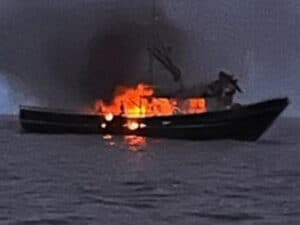
Shipping warned of dangers as Ukraine tensions mount
Written by Nick Blenkey
Screen grab from CGTN video of Russian naval exercises in Black Sea
MARAD has issued an advisory for the Black Sea and Sea of Azov, warning that regional tensions and increased naval activity in these areas could pose a risk to U.S.-flagged commercial shipping vessels.
U.S. flagged commercial vessels operating in the areas are advised to “exercise caution, conduct a risk assessment, review security measures, and incorporate appropriate protective measures into their vessel security plans. Vessels should ensure AIS is transmitting at all times (except when the master believes that continuing to operate AIS might compromise the safety or security of the ship or when a security incident is imminent), consistent with provisions of the International Convention for Safety of Life at Sea (SOLAS), and monitor VHF Channel 16.”
The advisory says that vessels operating in these areas may encounter GPS interference, AIS spoofing, and/or other communications jamming.
INSURERS REACT
The London insurance market’s Joint War Risks Committee has added Ukrainian and Russian waters in the Black Sea and the Sea of Azov to its “Hull War, Piracy, Terrorism and Related Perils” Listed Areas.
The world’s largest mutual provider of war risks insurance for ships, the UK War Risks club, has provided its members with a briefing note on the situation prepared by its intelligence partner, Risk Intelligence.
The club says that the key concerns for maritime security are:
- In case of direct confrontation, Russia is likely to use its naval superiority to control maritime traffic in the Azov and Black Sea near Crimea and the Ukrainian coast, including blockades of the Kerch Strait and major Ukrainian ports. This will impact the way merchant maritime traffic is conducted in the area.
- Another possible outcome is that Russia will engage Ukrainian naval assets in port and on patrol in the Black Sea, using land-based anti-ship missiles, air attacks and warships to cripple Ukrainian units.
- Similarly, Ukrainian units might attempt to engage Russian vessels. While this activity would likely be focused mainly on military targets, collateral damage in port areas or firing on civilian vessels due to mistaken targets cannot be ruled out.
- Russian naval or special forces units may be tasked with taking and holding major Ukrainian ports to cut off the country from the Black Sea, potentially leading to combat operations near and in port areas.
- It is also possible that Ukrainian special forces or other assets will attempt to sabotage Russian port infrastructure or other maritime targets, including the Kerch Strait Bridge to disrupt Russian planning and operations.
- Finally, it is possible that sea mines will be deployed by either party, meaning that civilian shipping will be at risk of collateral damage.
Download the Risk Intelligence briefing note




